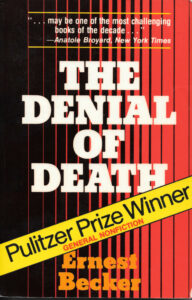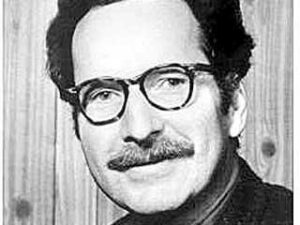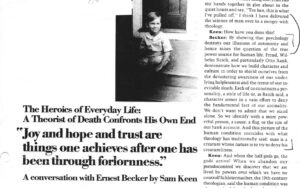 Two months after he died, Ernest Becker won the 1974 Pulitzer Prize for General Nonfiction for his book The Denial of Death. I guess, since he was dead, he was not a winner, but his book was.
Two months after he died, Ernest Becker won the 1974 Pulitzer Prize for General Nonfiction for his book The Denial of Death. I guess, since he was dead, he was not a winner, but his book was.
I’ve been thinking lately about Becker and his book and the profound influence they both have had on my life. I referenced his thoughts in a previous blog titled, “Our Struggle with Dying Starts When We’re Toddlers.”
Best-selling author, Mark Manson* includes The Denial of Death as one of “7 Books That Will Change How You See the World.” In Manson’s playful way he writes:
If This Book Could Be Summarized in An Image, That Image Would Be: The grim reaper silently laughing to himself watching you build an elaborate Lego set called “Life,” and you turning around and saying, “Stop laughing, this is important!”
The Denial of Death
 I’ll get to Becker’s deathbed below but first a few quotes from his classic. Note that Becker wrote in 1973 just as we were becoming aware that we no longer refer to all humans as “man.” I know better now but I will let his original words stand.
I’ll get to Becker’s deathbed below but first a few quotes from his classic. Note that Becker wrote in 1973 just as we were becoming aware that we no longer refer to all humans as “man.” I know better now but I will let his original words stand.
- “The main thesis of this book is…: the idea of death, the fear of it, haunts the human animal like nothing else; it is a mainspring of human activity—activity designed largely to avoid the fatality of death, to overcome it by denying in some way that it is the final destiny for man.” (p. ix)
- “The irony of man’s condition is that the deepest need is to be free of the anxiety of death and annihilation; but it is life itself which awakens it, and so we must shrink from being fully alive.” (p. 66)
- “In the prison of one’s character one can pretend and feel that he is somebody, that the world is manageable.” (p. 87)
- “Modern man is drinking and drugging himself out of awareness, or he spends his time shopping, which is the same thing.” (p. 284)
You may argue, “I DON’T spend any of my time thinking about my certain death.” I think Becker would say, “You just proved my point.”
Psychology Today and the deathbed conversation
 Soon after The Denial of Death arrived in late 1973, Sam Keen, one of the editors at the prestigious Psychology Today magazine, called Becker’s home hoping to set up an interview. Keen explained how the deathbed interview came about: “I called his home in Vancouver to see if he would be willing to tape a conversation. His wife Marie informed me that he had just been taken to the hospital and was in the terminal stage of cancer. The next day she called to say that Ernest would very much like to do the conversation if I could get there while he still had strength and clarity. So I went to Vancouver with speed and trembling, knowing that the only thing more presumptuous than intruding into the private world of the dying would be to refuse the invitation.”
Soon after The Denial of Death arrived in late 1973, Sam Keen, one of the editors at the prestigious Psychology Today magazine, called Becker’s home hoping to set up an interview. Keen explained how the deathbed interview came about: “I called his home in Vancouver to see if he would be willing to tape a conversation. His wife Marie informed me that he had just been taken to the hospital and was in the terminal stage of cancer. The next day she called to say that Ernest would very much like to do the conversation if I could get there while he still had strength and clarity. So I went to Vancouver with speed and trembling, knowing that the only thing more presumptuous than intruding into the private world of the dying would be to refuse the invitation.”
Here are a few quotes from THE expert on death as he lay dying:
- “Each of us constructs a personality, a style of life or, as Reich said, a character armor in a vain effort to deny the fundamental fact of our animality. We don’t want to admit that we stand alone.”
- “We do anything to keep ourselves from the knowledge that there is nothing we can do.… Well, this is the control aspect of character armor which is so vital to the human being.”
- “Joy and hope and trust are things one achieves after one has been through the forlornness.”
Keen noticed that Becker kept referring to “God” when divine transcendence had not previously been part of Becker’s writings. The dying man responded:
- “I don’t feel more religious because I am dying. I would want to insist that my wakening to the divine had to do with the loss of character armor.”
- “At the very highest point of faith there is joy because one understands that it is God’s world, and since everything is in His hands what right have we to be sad—the sin of sadness. But it is very hard to live that.”
Ernest Becker died in March 1974 at age 49. Two months later his book was awarded the Pulitzer Prize.
*Manson is author of The Subtle Art of Not Giving a F*ck, over 8 million books sold.
________________________
Chaplain Hank Dunn is the author of Hard Choices for Loving People: CPR, Feeding Tubes, Palliative Care, Comfort Measures and the Patient with a Serious Illness and Light in the Shadows. Together they have sold over 4 million copies. You can purchase his books at hankdunn.com or on Amazon.





